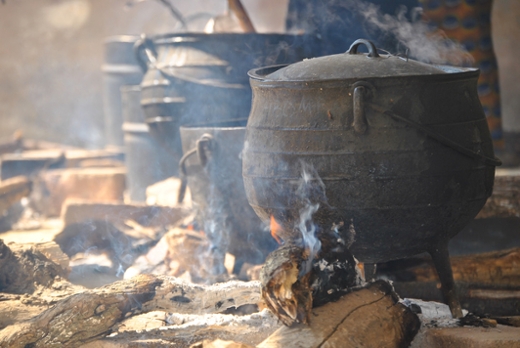The Rollins School of Public Health at Emory University, in collaboration with the School of Medicine at Johns Hopkins University and Colorado State University, has been awarded $30 million over five years for a multi-country randomized controlled field trial to assess the impact of cleaner burning cooking stoves on household air pollution and health in four low- and medium-income countries. The funding was awarded by the National Institutes of Health with partial support through a grant from the Bill & Melinda Gates Foundation.
Household air pollution is a leading risk factor for mortality globally, accounting for an estimated 2.9 million deaths annually in 2015. It is a major cause of pneumonia, the leading killer of young children in low-income settings; it is also believed to contribute to low birth weight and restricted linear growth in children and to increased blood pressure and other cardiovascular and respiratory effects in adults. The main source of household air pollution is indoor cooking and heating on traditional stoves using solid fuels, such as wood, coal, and charcoal. Globally three billion people still cook or heat with open fires or traditional stoves using solid fuels.
"Previous interventions have provided cleaner solid fuel-based stoves, but have generally failed to produce expected reductions in exposure to household air pollution and improvements in health," says Thomas Clasen, JD, PhD, professor of Environmental Health at Rollins School of Public Health. "There have been no large-scale field trials with gas stoves, which are likely the cleanest scalable intervention in these settings."
The study is led by Clasen, along with Jennifer Peel, PhD, professor of Epidemiology at Colorado State University, and William Checkley, MD, PhD associate professor of Medicine, International Health, and Biostatistics at Johns Hopkins University. The research team includes colleagues at their respective institutions as well as investigators from Sri Ramachandra University in India, the London School of Hygiene & Tropical Medicine, Washington University in St. Louis, AB PRISMA and the Universidad Peruana Cayetano Heredia in Peru, the Universidad del Valle de Guatemala, the University of Georgia, Harvard University, Berkeley Air Quality Monitoring and the University of California San Francisco.
The research team will establish trial sites in India, Guatemala, Peru, and Rwanda that will each recruit 800 pregnant women into the study. Half of the 3,200 participating households will be randomly assigned to receive liquefied petroleum gas stoves and the other half will serve as controls using their customary cooking practices. Participating households will be followed for 30 months with extensive monitoring of stove use and personal exposure to household air pollution, as well as extensive assessments of health outcomes including birth weight, preterm birth, growth and respiratory infections in children and respiratory function, blood pressure, inflammation, and other indicators of heart disease in adults. "The broad range of health outcomes that we will assess will provide an unprecedented opportunity to link health and exposure to household air pollution," explains Checkley.
The proposed trial will provide compelling evidence to inform national and global policies on interventions to reduce household air pollution among vulnerable populations. "The implementation of these common protocols in our four diverse trial sites should provide policymakers with the information they need in order to make decisions about scaling up clean cooking," says Peel.
"Research reported in this publication was supported by the National Heart, Lung, And Blood Institute of the National Institutes of Health under Award Number UM1HL134590. The content is solely the responsibility of the authors and does not necessarily represent the official views of the National Institutes of Health."

